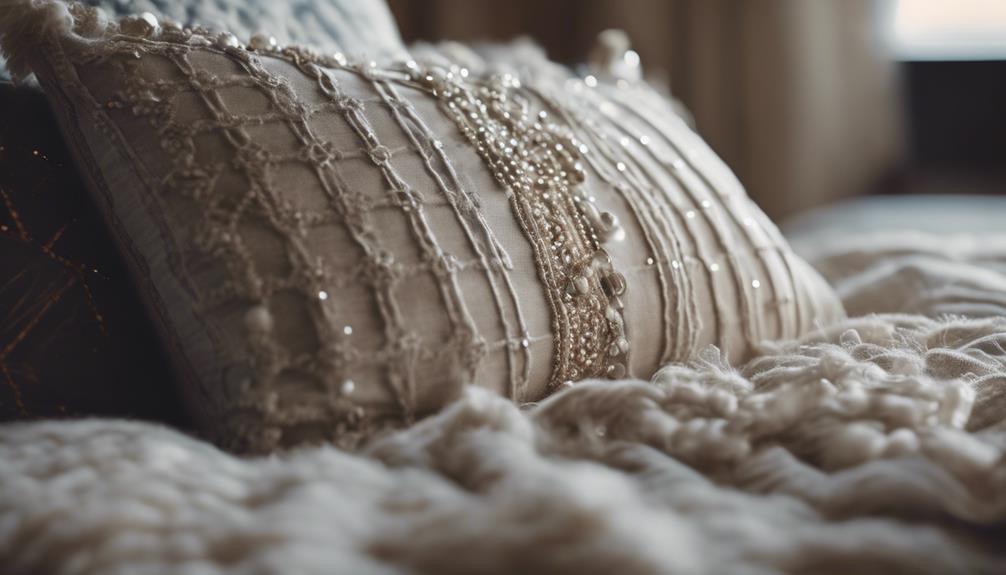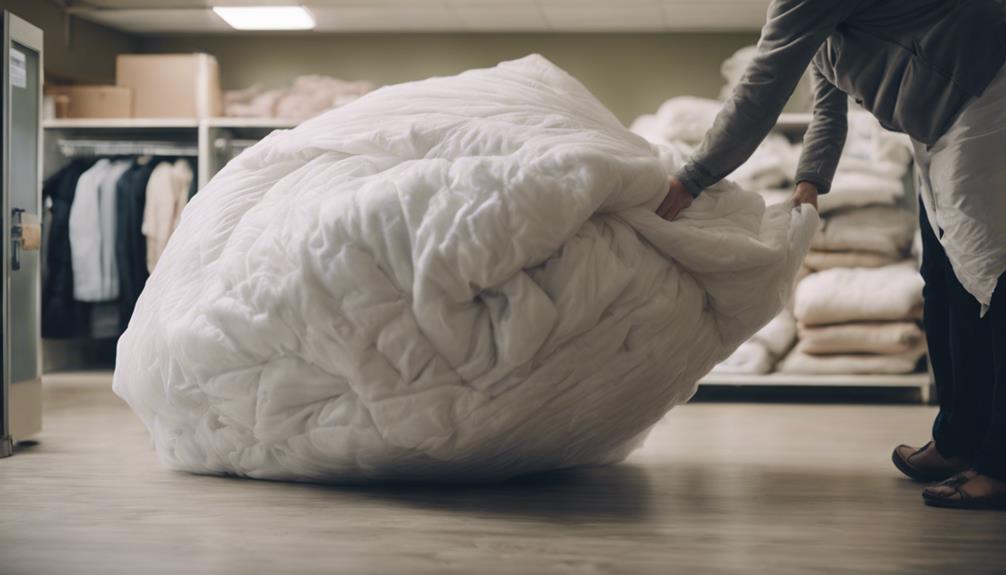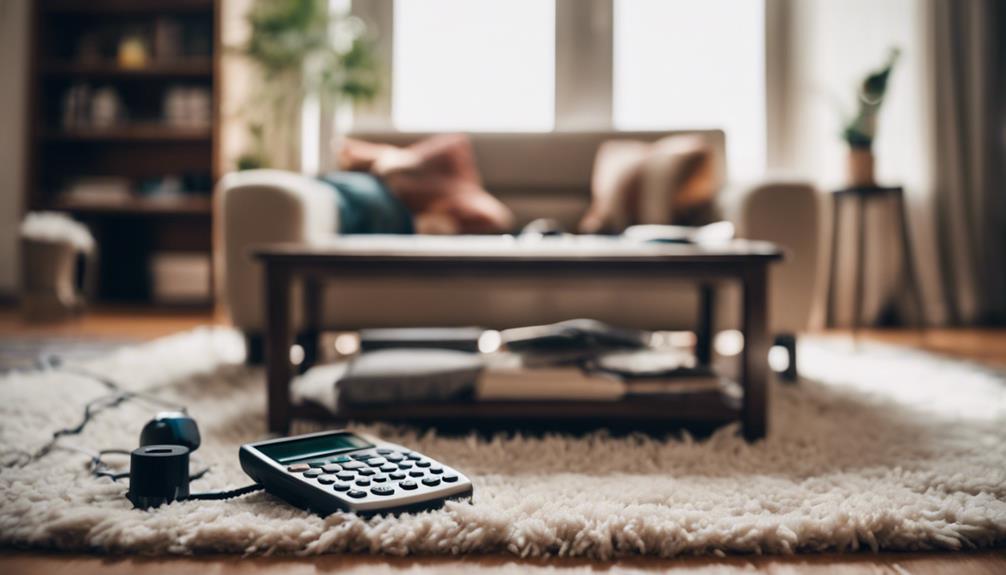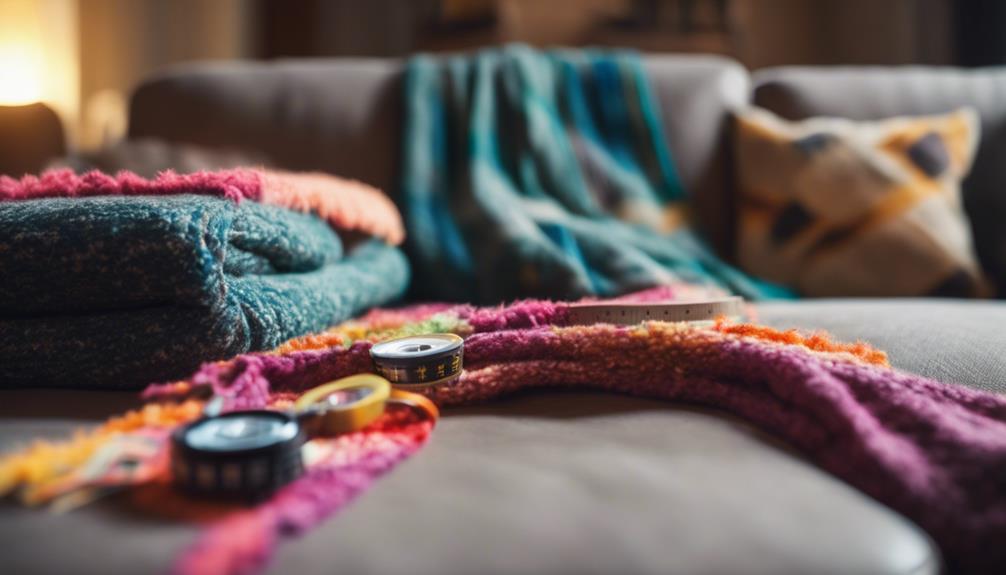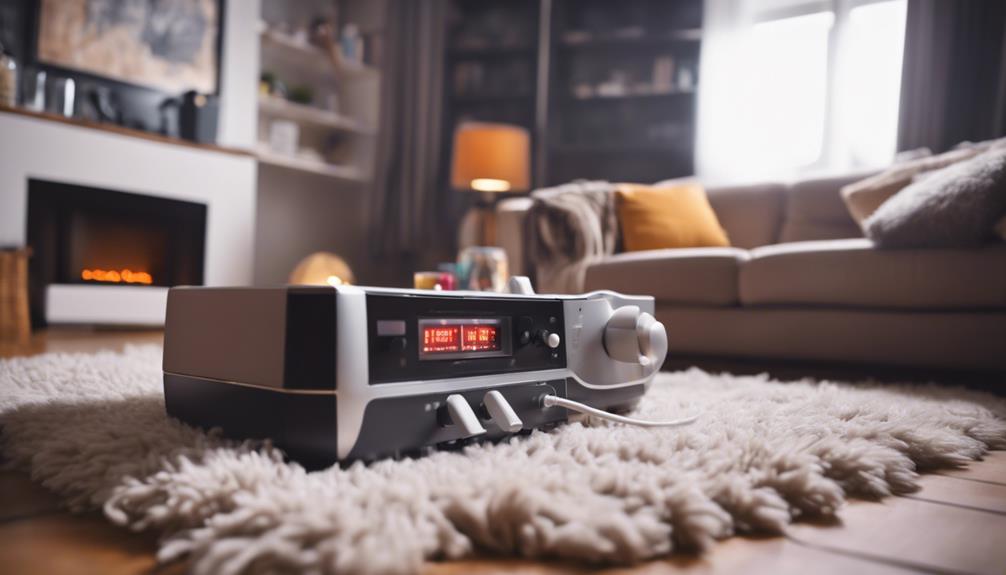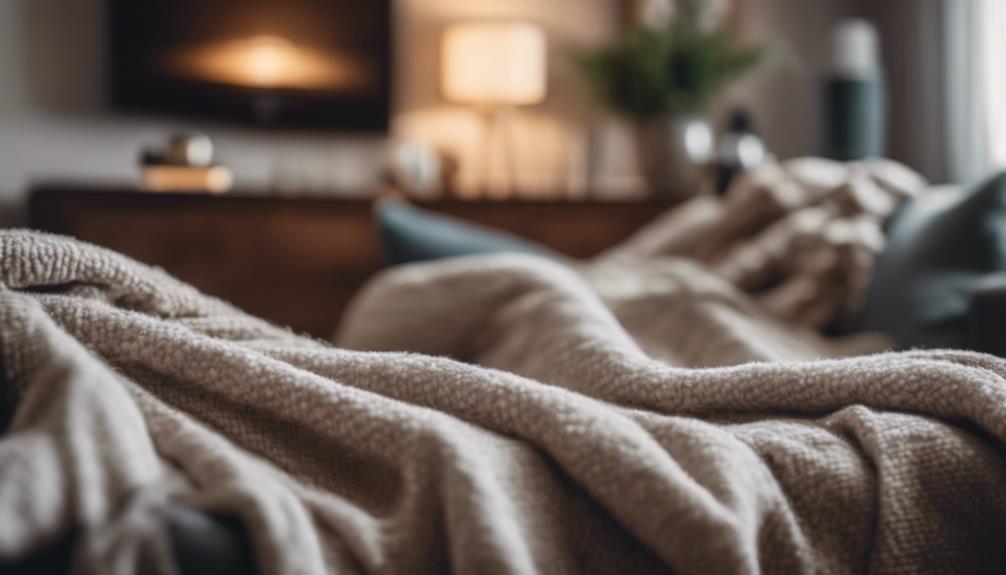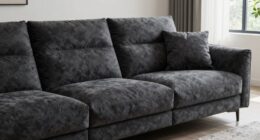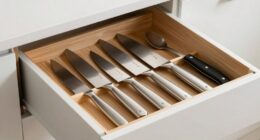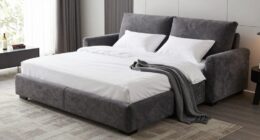When creating a throw pillow, the costs are influenced by various factors such as the type of fabric, size, quality, and design complexity. Fabric options can range from $5 to $20 per pillow, affecting both the cost and the overall quality. Customization, trims, and embellishments can increase expenses. Labor costs typically range from $25 to $30, depending on the level of expertise and effort required. The use of high-end materials and intricate designs can further escalate the overall costs. It is important to also consider additional expenses such as inserts, cording, and specialty fabrics. Shipping fees will vary based on the weight and location, contributing to the total expenses. To get a better grasp of throw pillow costs, it is recommended to consider factors like size variations, fabric quality, trimming expenses, and more.
Key Takeaways
- Fabric choice and quality significantly impact the cost.
- Labor expenses range from $25 to $30 per pillow.
- Additional costs include inserts, cording, and specialty fabrics.
- High-end materials and intricate designs increase production expenses.
- Shipping fees vary based on weight and destination.
Factors Affecting Throw Pillow Cost
How do various factors influence the cost of making a throw pillow?
When it comes to the cost of creating a throw pillow, the type and quality of fabric play a significant role. Different fabrics come at varying price points per yard, impacting the overall expense of the pillow production process. Factors such as the durability, texture, and design of the fabric can also affect pricing. Choosing a high-quality fabric may increase the cost but can result in a more luxurious and long-lasting pillow.
Additionally, the fabric choice can influence the aesthetic appeal and feel of the throw pillow. Fabrics like velvet or silk tend to be pricier compared to cotton or polyester. The fabric selection can also impact how easy or challenging it's to work with during the manufacturing process, potentially affecting labor costs. By carefully considering the fabric options and their associated costs, one can make informed decisions to create a throw pillow that meets both budgetary and design requirements.
Size and Shape Options
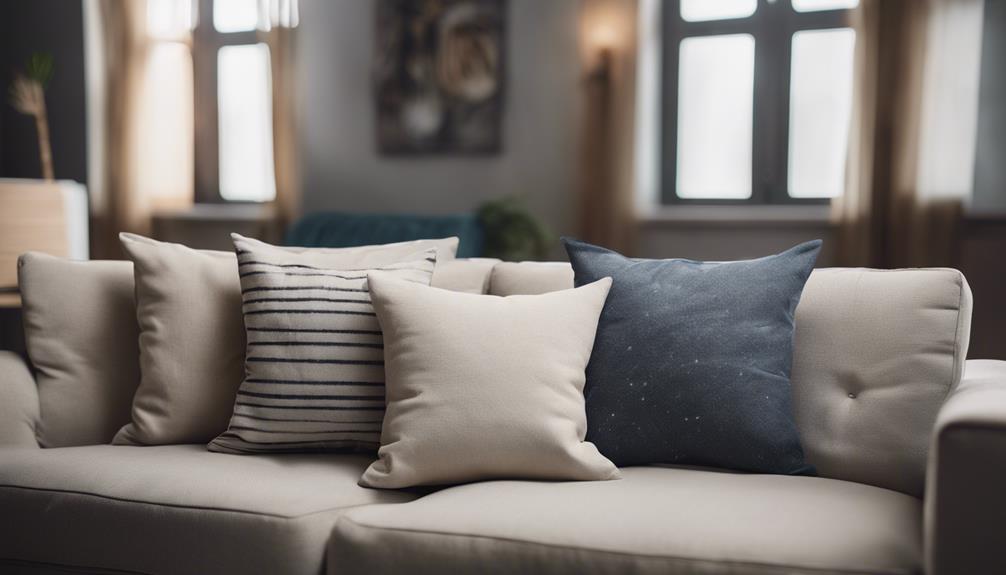
When considering throw pillows, the variety of size and shape options available cater to different preferences and decor styles. Throw pillows commonly come in sizes like 16×16 inches, 18×18 inches, and 20×20 inches, with rectangular options typically measuring 12×18 inches or 12×24 inches.
Square throw pillows are the most popular shape for decorative use, while bolster pillows feature a cylindrical shape with varying lengths and diameters. For those looking to add a unique touch to their space, custom throw pillows offer the flexibility to create pillows in shapes such as round, heart-shaped, or star-shaped.
These custom pillows allow individuals to tailor their decor to suit their personal style and stand out from traditional pillow options. Whether you prefer a classic square pillow or a custom-designed shape, the size and shape choices for throw pillows make it certain there's something to fit every taste and need in home decor.
Fabric Choices and Quality
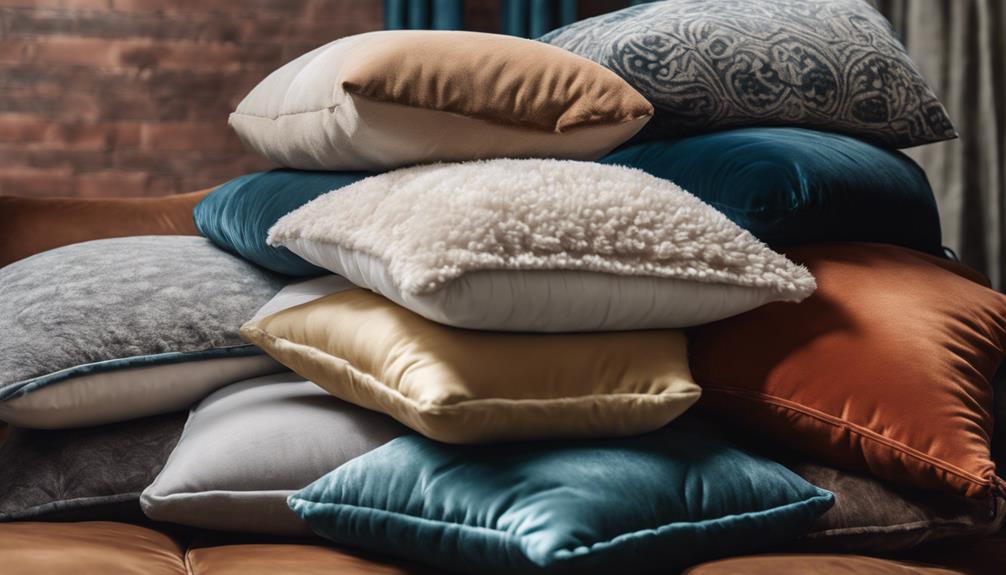
When making throw pillows, the fabric choices we make have a notable impact on the overall cost and quality of the end product. Opting for high-quality upholstery fabrics can raise the price per pillow to around $10 to $20, but employing creative sourcing methods might bring it down to $5 to $12 per pillow.
It's crucial to ponder the durability and aesthetic appeal of medium to heavy-weight fabrics in colors and patterns that harmonize with your home decor style.
Fabric Types Impact Cost
Selecting the right fabric for throw pillows greatly impacts the overall cost of production, with higher quality materials typically translating to higher expenses. The choice of pillow fabric, such as upholstery fabrics ranging from $10-$20 per pillow, directly affects the total cost.
Different fabric weights play an important role in both durability and cost, with medium to heavy weight fabrics being more suitable for long-lasting throw pillows. To reduce costs creatively, one can consider using alternative options like tablecloths, dish towels, or napkins for affordable pillow covers.
It's also beneficial to order fabric samples and understand fabric weight to make informed decisions when selecting cost-effective materials for custom throw pillows.
Quality Affects Price
Considering the impact of fabric choices on cost, the quality of materials directly influences the price of making a throw pillow. Higher fabric quality, such as upholstery fabric, can range from $10 to $20 per pillow, while creatively finding affordable yet good-quality fabrics can lower costs to $5 to $12 per pillow.
Upholstery fabrics, despite being pricier, offer durability and a luxurious touch to the throw pillow. Opting for high-quality fabric is an investment in the pillow's longevity and aesthetic appeal. Fabric quality is a significant factor in the overall cost of producing a throw pillow, with different qualities of fabric impacting the final price.
Making informed choices regarding fabric quality can lead to a balance between cost and durability.
Material Selection Influences Expense
Our choice of fabric greatly influences the expense of producing a throw pillow. Different fabrics come at varying costs, with upholstery fabrics typically ranging from $10 to $20 per pillow.
However, by creatively sourcing materials like tablecloths, dish towels, and napkins, costs can be reduced to $5 to $12 per pillow. Opting for higher quality fabrics may increase the overall cost but can enhance durability and aesthetic appeal.
It's advisable to select medium to heavy weight fabrics for increased durability and longevity of the throw pillow. Ordering fabric samples before deciding can help guarantee the accuracy of material selection and long-term cost-effectiveness.
Careful consideration of the fabric used is essential in determining the final expense of the throw pillow production.
Trimming and Embellishment Costs
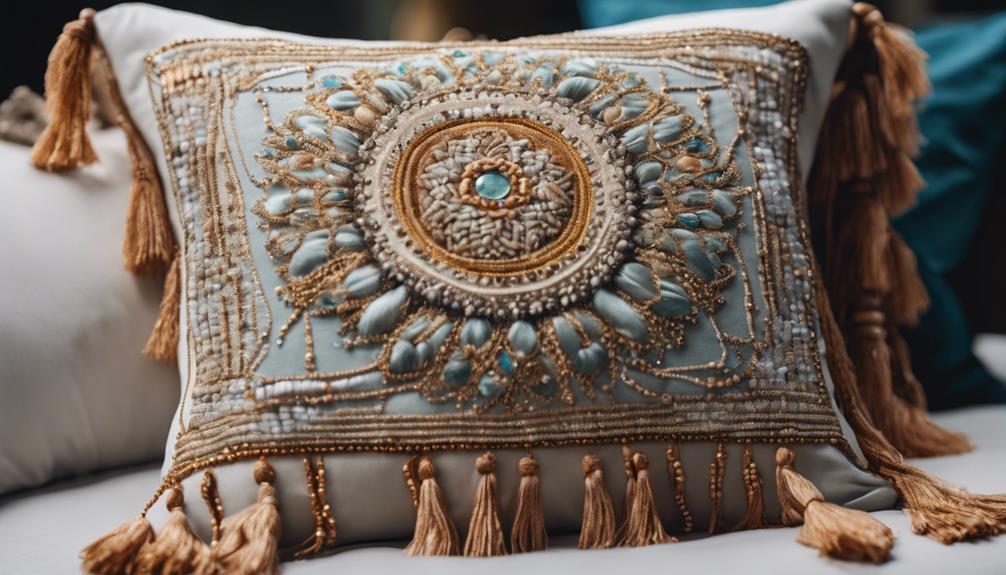
When considering trimming and embellishment costs for throw pillows, weighing various design choices for the trims is crucial, ensuring they align with the overall aesthetic.
Selecting different materials for embellishments can impact the final cost, with options ranging from simple cording to intricate beading.
Exploring cost-effective embellishment alternatives can help achieve the desired look without exceeding the budget.
Trim Design Choices
Exploring various trim design choices for throw pillows can greatly impact the overall cost of production. When considering trimming options, it's vital to weigh the cost implications alongside aesthetic preferences. Here are key points to keep in mind:
- Cording or Fringe Trim: Adding these can increase costs by $5-$15 per pillow.
- Embellishments: Beads or sequins can further raise prices depending on intricacy.
- Custom Designs: Unique trims contribute to the pillow's aesthetic appeal.
- Choices: Piping, tassels, pom-poms, or ruffles offer varied style options.
Opting for higher-end trims with premium materials can considerably elevate the cost of creating a throw pillow, so it's important to balance design choices with budget considerations.
Embellishment Material Selection
Exploring different embellishment material options is essential when calculating the overall cost of making a throw pillow. Trimming and embellishment costs for decorative pillows can vary based on the type of embellishments chosen, such as cording, tassels, or ruffles.
Adding decorative elements like piping or fringe can increase the overall cost greatly. Custom trimmings like beading or sequins can elevate the price even more. It's important to factor in the cost of embellishments when making a decorative throw pillow.
These different trimmings and embellishments play an important role in creating the unique design and aesthetic appeal of a custom throw pillow. Selecting the right embellishment materials is key to achieving the desired look while managing costs effectively.
Cost-Effective Embellishment Options
When creating cost-effective throw pillows, it's worth exploring trimming and embellishment options that strike a balance between aesthetic appeal and affordability. Custom embellishments can enhance the look of your pillows without exceeding your budget. Here are some economical options to explore:
- Cording or Trim: Incorporating cording or trim can incur a cost of $5-$10 per pillow, depending on the intricacy of the design.
- Tassels or Fringe: Adding tassels or fringe typically increases the overall cost by $10-$20.
- Custom Embroidery or Applique: Opting for custom embroidery or applique can raise the cost by $15-$30 per pillow, depending on the complexity of the design.
- Beaded or Sequin Embellishments: Including beaded or sequin embellishments can add $20-$40 to the total cost, factoring in materials and labor.
Customization and Personalization Expenses
Taking into account the level of detail and materials utilized, customization and personalization expenses for making a throw pillow typically range from $10 to $50. Factors such as fabric choice, embellishments, and trimmings all contribute to the customization expenses of custom throw pillows. Personalized options like monogramming, custom embroidery, or unique patterns can increase the overall cost of creating a custom throw pillow.
Additionally, specialty fabrics, custom sizes, and intricate designs are elements that can elevate the expenses associated with making a personalized throw pillow. The cost of customization in throw pillows varies based on the complexity of the design and the artisan's craftsmanship, reflecting the value of personalized home decor items. These costs are essential when planning to create a unique and personalized throw pillow that suits individual preferences and style.
Price Range for Basic Throw Pillows
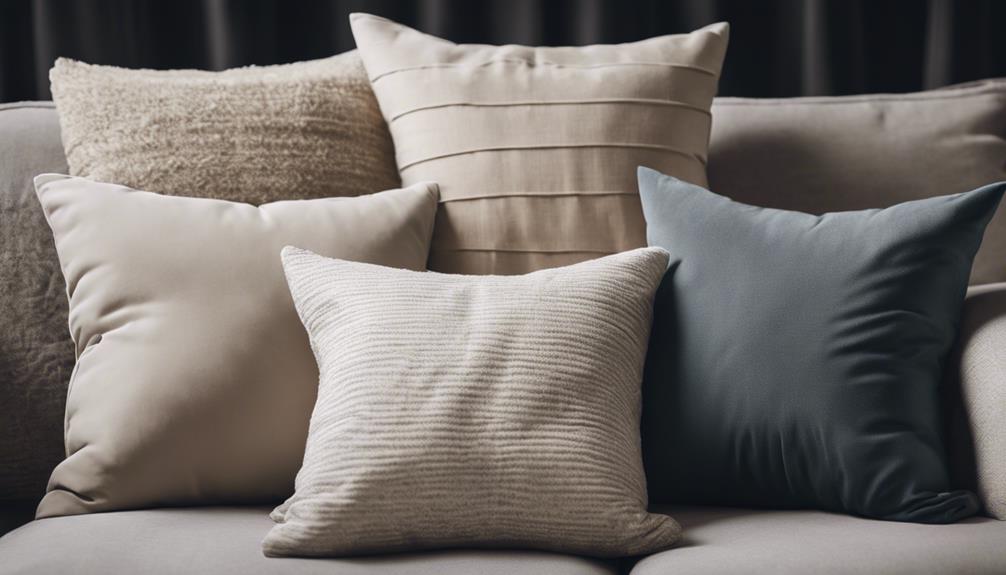
When it comes to basic throw pillows, the price range can vary considerably. Standard store-bought options typically range from $20 to $80 each, while custom-made ones can be pricier due to the cost of materials and labor.
DIY throw pillows, on the other hand, offer a more cost-effective alternative, with pillow inserts ranging from a few dollars to $50.
Materials Cost Comparison
In investigating the cost of making a throw pillow, we examine the price range for basic throw pillows based on materials. When comparing material costs, we find that:
- Store-Bought Pillows: Standard throw pillows typically range from $20-$80 per pillow, varying by quality and brand.
- Custom-Made Pillows: These are pricier due to costly fabrics and labor expenses.
- DIY Pillow Inserts: Costs range from a few dollars to $50, offering a budget-friendly option.
- Fabric Expenses: Upholstery fabrics can cost $10-$20 per pillow, but sourcing creatively can bring this down to $5-$12 depending on the material chosen.
Understanding these cost differences can help in making informed decisions when creating or purchasing throw pillows.
Labor Expenses Breakdown
We typically charge labor costs ranging from $25 to $30 per pillow for basic throw pillows, factoring in the time, expertise, and effort required for custom sewing work. This price range reflects the intricacy of crafting each pillow to meet our high standards.
By openly outlining these labor expenses, we guarantee clarity and trust with our clients. Clearly communicating the labor charges involved in creating throw pillows is essential for maintaining positive relationships and setting realistic expectations.
Setting a fair labor cost not only values the skills of our team but also acknowledges the time and dedication invested in every pillow. Our commitment to quality craftsmanship is evident in the attention to detail we put into each pillow we create.
High-End Materials and Intricate Designs
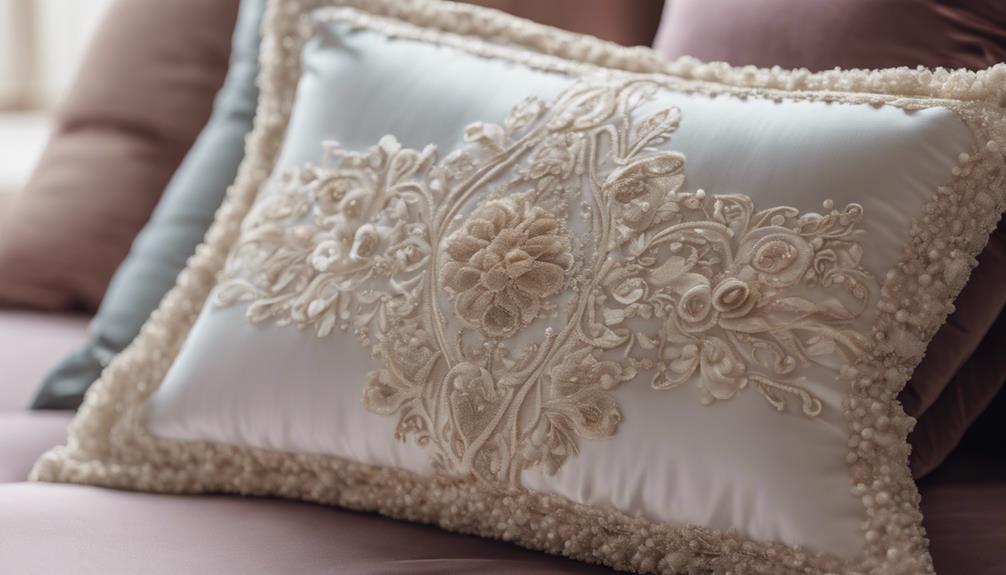
When opting for luxurious materials such as silk or velvet, it's crucial to keep in mind the factors that contribute to the increased expenses when choosing high-end materials and intricate designs:
- Quality of Materials: Premium fabrics like silk or velvet come at a higher price point, which raises the overall cost of the throw pillow.
- Labor Intensity: Intricate designs such as embroidery or hand-painting require skilled labor, which adds to the production expenses.
- Specialized Techniques: Techniques like quilting or appliqué demand more time and expertise, resulting in higher manufacturing costs.
- Additional Embellishments: Decorative elements like tassels, fringe, or sequins not only require extra materials but also increase labor hours, impacting the final price of the throw pillow.
When aiming for a luxurious and unique throw pillow, it's important to take into account these aspects that contribute to the higher costs associated with high-end materials and intricate designs.
Additional Costs to Consider
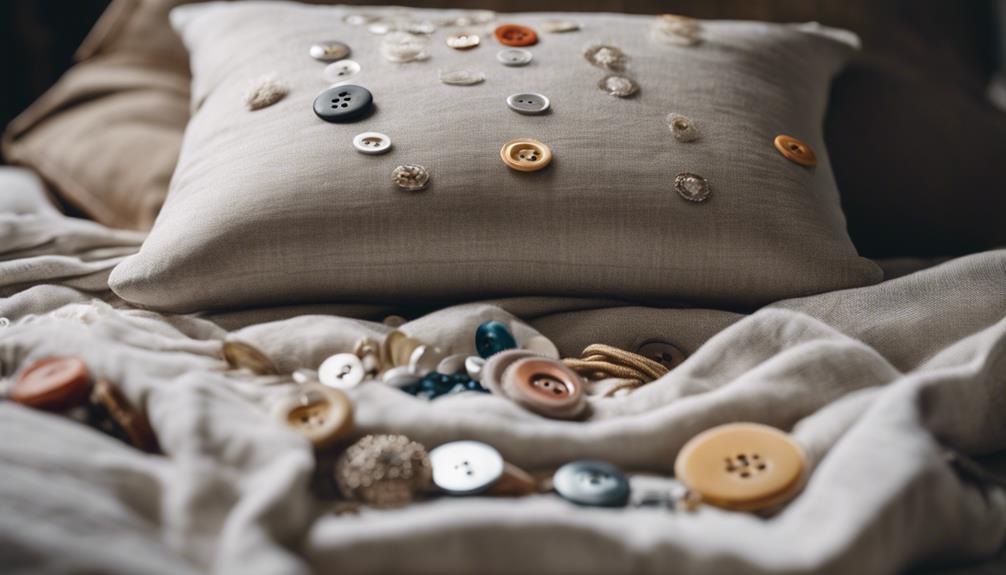
Given the various components involved in throw pillow production, it's important to factor in additional costs beyond just fabric and labor. When making throw pillows, other expenses to take into account include pillow inserts, cording, and potentially specialty fabrics.
Pillow inserts vary in price depending on the desired quality and size, ranging from a few dollars to $50 per insert. Cording, if used for decorative purposes, adds to the overall cost. Additionally, the choice of fabric plays a significant role in determining the total expenses. Upholstery fabrics, known for their durability and quality, often come at a higher price point compared to standard fabrics.
Labor costs for sewing custom throw pillows should also be taken into consideration, typically falling within the range of $25 to $30 per pillow. Keeping these additional costs in mind, the total cost of producing a throw pillow can start around $20 but may increase significantly depending on design preferences and material selections.
Shipping Fees and Delivery Charges
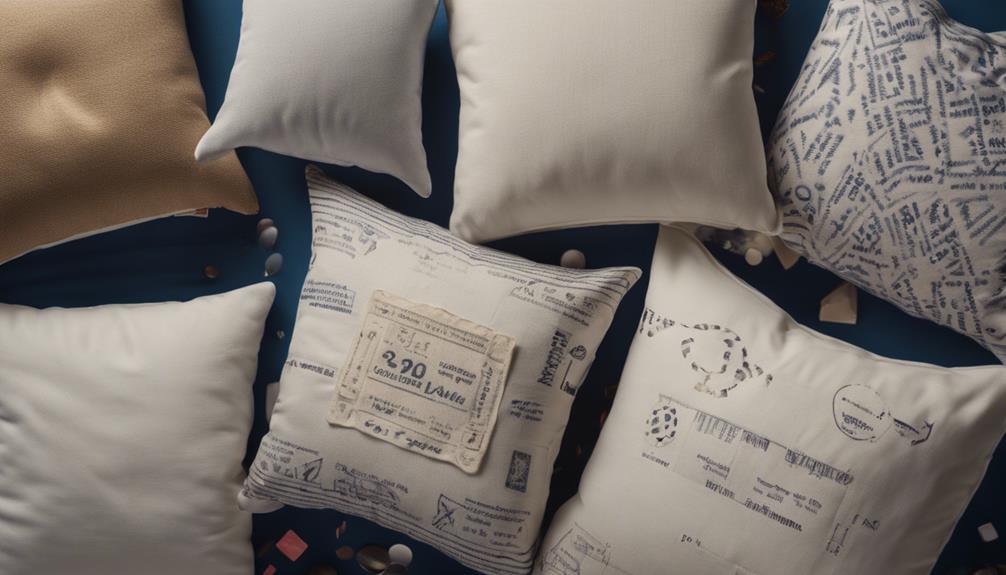
When considering the cost of custom throw pillows, factoring in shipping fees and delivery charges is essential. Here are some key points to keep in mind regarding shipping fees and delivery charges for throw pillows:
- Variability: Shipping fees for custom throw pillows can vary based on factors such as weight and destination. This variability means that costs may fluctuate depending on where the pillows are being shipped.
- Free Shipping Offers: Some retailers may offer free shipping on throw pillow orders that exceed a certain amount. Taking advantage of these offers can help reduce overall costs.
- International Orders: For orders outside the local region, international shipping charges may apply. It's important to be aware of these potential extra costs when ordering throw pillows from abroad.
- Expedited Options: If you need your throw pillows to arrive quickly, expedited shipping options are available for an additional cost. These options provide faster delivery but come with a higher price tag.
Budgeting Tips for Custom Throw Pillows
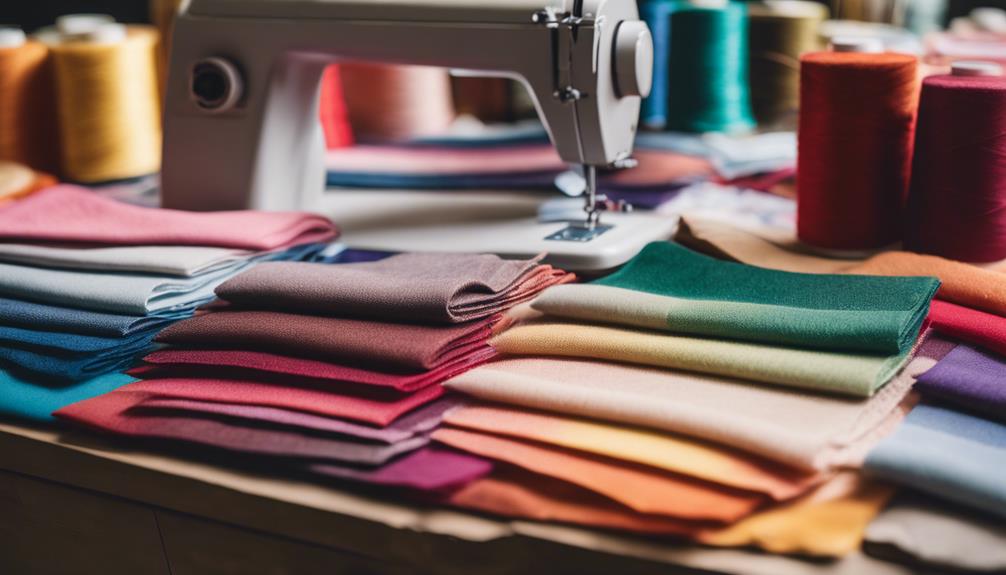
To budget effectively for custom throw pillows, we recommend carefully considering cost-saving fabric options and creative sourcing strategies. Fabric is a significant expense when making pillow covers, with upholstery fabrics typically costing between $10 to $20 per pillow. However, by creatively sourcing fabrics from more affordable outlets, costs can be reduced to a range of $5 to $12 per pillow. One effective way to save on fabric costs is by exploring unconventional options like using tablecloths, dish towels, and napkins as materials for your custom throw pillows. These alternatives can be both cost-effective and offer a unique touch to your pillows. By being resourceful with your choice of fabric, you can achieve a stylish look for your throw pillows while staying within your budget.
| Fabric Options | Cost per Pillow |
|---|---|
| Upholstery Fabrics | $10-$20 |
| Creative Sourcing | $5-$12 |
| Tablecloths | Affordable |
| Dish Towels/Napkins | Budget-friendly |
Frequently Asked Questions
Is It Cheaper to Make Your Own Throw Pillows?
It's definitely cheaper to make your own throw pillows. You can save money by customizing the design, size, and fabric.
DIY projects give you the flexibility to choose affordable materials and reduce overall costs. Plus, making your own pillows lets you control the quality, style, and expenses, making it a budget-friendly home decor option.
How Much Should a Throw Pillow Cost?
Throw pillows can range from $20-$80 in stores, but custom-made ones cost more due to pricier fabrics and labor. When making your own, DIY can save a lot.
Pillow inserts vary from a few dollars to $50, while fabric, a key expense, can range from $5-$20 per pillow. Consider material, labor, and extra features like cording or zippers to set a fair price. The cost can vary widely based on choices.
What Makes a Throw Pillow Expensive?
When it comes to what makes a throw pillow expensive, factors like premium materials, intricate designs, and customization options play a significant role.
High-quality fabrics, exquisite trims, and hand-sewn details can drive up the cost due to the craftsmanship and attention to detail involved. Additionally, unique patterns and personalized touches contribute to the overall price tag of a throw pillow, reflecting the time, skill, and materials invested in its creation.
Is a Throw Pillow Business Profitable?
Running a throw pillow business can be profitable with smart cost management and strategic pricing. Factors like material costs, labor expenses, and market demand all influence profitability.
Offering unique designs and customization options can attract customers willing to pay premium prices. Effective marketing, customer engagement, and quality control are essential for maximizing profits.
With the right approach, a throw pillow business can indeed be profitable.
Can Sleeping Habits Affect the Cost of Making Throw Pillows?
The cost of making throw pillows can be influenced by throwing pillows while sleeping. Poor sleeping habits can lead to wear and tear on pillows, increasing the need for replacement. By maintaining good sleep practices, such as avoiding pillow throwing, the cost of making throw pillows can be minimized.
Conclusion
To sum up, the cost of making a throw pillow can vary depending on factors such as size, fabric choice, and customization options. By considering these factors and budgeting accordingly, you can create a personalized throw pillow that fits your style and budget.
Remember to factor in additional costs like trimming, embellishments, and shipping fees to make sure you stay within your desired price range.
With careful planning and decision-making, you can enjoy a custom throw pillow that adds a touch of comfort and style to your space.
